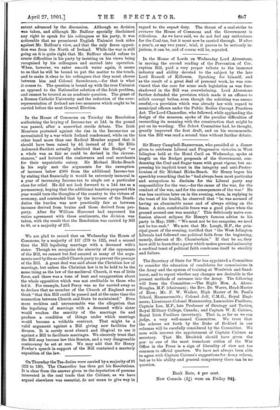We are glad to record that on Wednesday the House
of Commons, by a majority of 157 (279 to 122), read a second time the Bill legalising marriage with a deceased wife's sister. Though we recognise the sincerity of the opponents of the Bill, we cannot but feel amazed at many of the argu. ments used by the so-called Church party to prevent the passage of the Bill. A great deal was said about the Christian law of marriage, but unless the Christian law is to be held to be the same tiling as the law of the medizeval Church, it was of little force, and there was a tone of heat and exaggeration about the whole opposition which was not creditable to those who led it. For example, Lord Percy was so far carried away as to declare that no member of the Church of England must think "that this Bill could be passed and at the same time the connection between Church and State be maintained." Even more reckless and unreasonable was the allegation that the legalising of marriage with a deceased wife's sister would weaken the sanctity of the marriage tie and produce a condition of things under which marriage would become a voidable .contract That might be a valid argument against a Bill giving new facilities for divorce. It is surely most absurd and illogical to use it against a Bill to facilitate marriages. We sincerely trust that the Bill may become law this Session, and a very disagreeable controversy be set at rest. We may add that Sir Henry Fowler's speech in support of the Bill contained a masterly exposition of the law.






















































 Previous page
Previous page